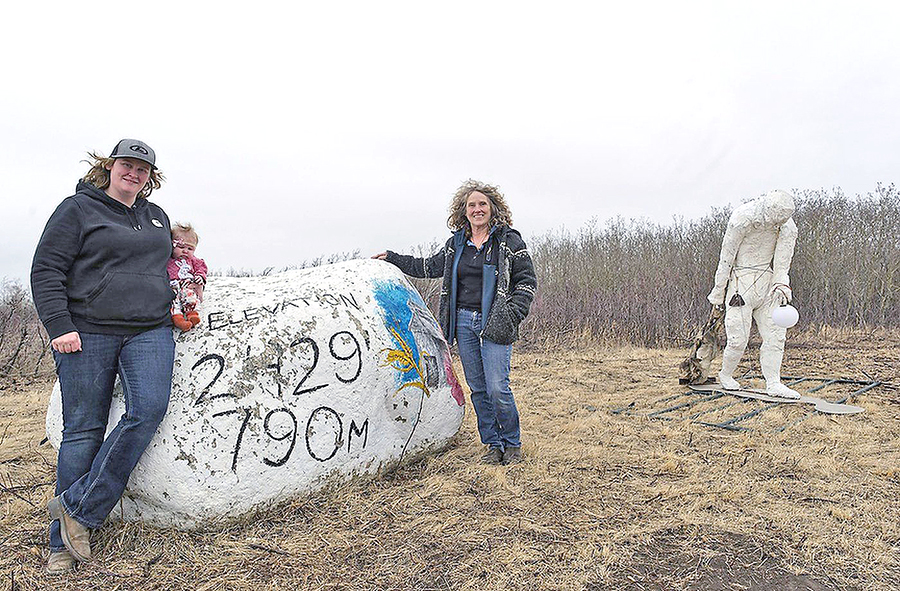Community supported agriculture now in Forestburg

For Flagstaff residents who enjoy garden-fresh produce, but don’t have the time or opportunity to put in the work required, TJ’s Market Garden near Forestburg offers a chance to purchase shares in their harvest.
Tim and Jody Johnsey are in their third year of direct marketing their garden harvest.
It all started when their youngest daughter, who suffered from severe allergies, found some relief when she had mostly vegetables in her diet. What the Johnsey family discovered was that the initial relief from allergy symptoms started to decline until they started growing their own food in their garden.
As her symptoms abated, the Johnseys realized that the allergies may have been tied to food additives that are often used in store-bought produce to keep it fresh, or even in the type of fertilizer used to grow the food.
“We don’t use chemicals in our garden,” Tim says, and they are striving to attain the certified naturally grown (CNG) certification. “Certified naturally grown is similar to organic certification, because it requires compliance of the standards for organic certification, however the inspection and record-keeping requirements are different.”
While their land is located near farmland, the Johnseys say that the surrounding land is not 100 per cent agricultural use, and that their farming neighbours are good about spraying their crops when the wind may cause drift. “They’ve always been very considerate, initially of our daughter’s health, and now also of our market garden.”
The change from gardening for themselves and growing to sell has brought big changes to their lives, “We loved our isolation before, but more people drove into our place in the first month than the past 17 years,” Tim says.
As with any small business, steady labour is always an issue, as the gardens tend to have periods when a lot of work is required, as well as regular weeding. “We use innovative methods to control weeds, but it is more labour intensive,” says Tim.
He says they found that some weed cover can actually be somewhat beneficial in the garden.
As with any agricultural operation, weather plays a big factor in the success and the variety of produce. Johnseys say that last year a killing frost combined with a lack of labour was detrimental to their later season. Some crops, too, that were expected to survive the winter ended up being eaten by deer.
They had a very successful season last year nonetheless, selling from the farm, and from Donald to Lloydminster at farmers markets.
“We find we’re often up against other market gardeners using chemicals who claim they do not,” Tim says.
He says the taste of the produce is often what makes loyal customers, and keeps them coming. “Taste sells.”
They got into market gardening almost by accident. In fact, their tomatoes were one of the main reasons why they started selling their produce. “We had one greenhouse, and people kept asking if we had tomatoes for sale. Now we have customers who come out and pick their own.”
“This is the produce their parents and grandparents were growing in their gardens.”
They now have a second 30′ by 90′ greenhouse, as well as their outdoor gardens.
The pair are members of the Alberta Greenhouse Growers Association, which provides them with access to a lot of information, “Like carbon tax rebates,” Tim says.
Their greenhouse is heated with a coal boiler. “Coal in 2016 was $18 a tonne, now it’s $58, and we’re using hundreds of tonnes to fire the boiler.” Their propane backup system now costs twice as much to operate as well.
“Vegetables need a constant temperature, so we’re heating through the night and part of every day.”
Since starting the market garden business, Tim says he is always researching new methods of gardening, as well as new crops. “We thought we would try Kohlrabi last year, we planted three hundred-foot rows of it, and sold every one.”
READ the FULL STORY in the May 16 edition of The Community Press. Call 780-385-6693 to purchase back-issues. Never miss an issue – become a subscriber today! CLICK HERE!
Print is still the most effective medium. Attract LOCAL customers by supporting LOCAL media. ads@thecommunitypress.com
Leslie Cholowsky
Editor








